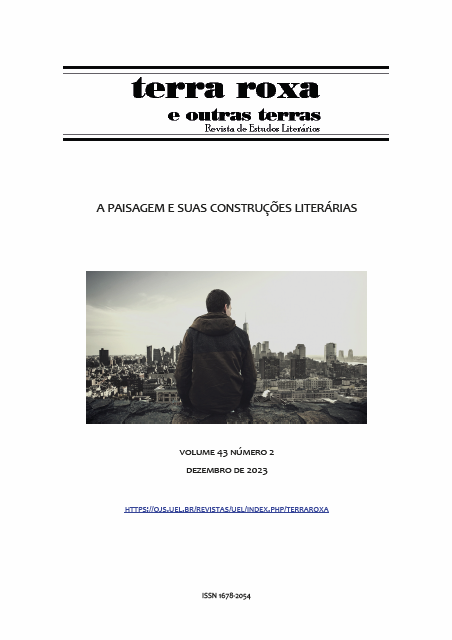Literary text and broadening of horizons
DOI:
https://doi.org/10.5433/1678-2054.2023vol43n2p157Keywords:
Space, Landscape, Literature, PoemAbstract
This article presents a sequence of activities designed and implemented with the aim of encouraging reflections on the influence of space and landscape on us and ways of literary production based on these reflections among middle school students. We chose a 6th grade class to participate in these activities because we understand the need to establish a dialogue between academia and teaching, applying the theoretical assumptions of the former in the latter, and making the gap between research and its application in basic education smaller. In addition to contributing to the dialogue between the different spheres of education, we present another contribution resulting from the obtained results: the stimulation of literary reader formation, allowing the students to express themselves through the activities carried out and understanding their existence from the space in which they live. For this purpose, we chose the poetry genre due to its creative and expressive potential, as well as its proximity to students of this age group.
Downloads
References
BASTOS, Ana Regina Vasconcelos Ribeiro. Espaço e literatura: algumas reflexões teóricas. Espaço e Cultura, Rio de Janeiro, n. 05, 1998. Disponível em: https://doi.org/10.12957/espacoecultura.1998.6316.
BAKHTIN, Mikhail. Estética da criação verbal. Trad. Paulo Bezerra. 6ª. ed. São Paulo: Martins Fontes, 2011.
BRASIL. Ministério da Educação. Base Nacional Comum Curricular. Brasília, 2018.
CANDIDO, Antonio. O estudo analítico do poema. 5ª. ed. São Paulo: Humanitas, 2006.
CANDIDO, Antonio. O direito à literatura. Vários Textos. Rio de Janeiro: Ouro Sobre Azul, 2011. 171-193.
GOLDSTEIN, Norma. Versos, sons, ritmos. 13ª. ed. São Paulo: Ática, 2005.
GOMES, Paulo César da Costa. A condição urbana: ensaios de geopolítica da cidade. 2ª. ed. Rio de Janeiro: Bertrand Brasil, 2006.
GUIMARÃES, Elisa. Linguagem literária. Rodrigo Hubner et al. Diário de Classe, n. 3, Língua Portuguesa. São Paulo: FDE SEESP, 1994. 77-84.
JOLIBERT, Josette et al. Para formar crianças leitoras e produtoras de poemas. Josette Jolibert et al. Formando crianças produtoras de texto. Trad. Bruno Charles Magne Porto Alegre: Artmed, 1994. 195-207.
MASSCHELEIN, Jan & Maarten Simons. Em defesa da escola: uma questão pública. Belo Horizonte: Autêntica, 2017.
PINHEIRO, André. O nascimento de uma nova cidade: aspectos da condição urbana na poesia de Zila Mamede. Odisseia, Natal, n. 4, 2012. Disponível em: https://periodicos.ufrn.br/odisseia/article/view/2035.
SESI, Serviço Social da Indústria. Referencial Curricular do Sistema SESI-SP de Ensino: Ensino Fundamental. São Paulo: SESI-SP Editora, 2020.
SILVA, Cristina Vieira da, Marta Martins & Joana Cavalcanti. Ler em família, ler na escola, ler na biblioteca: boas práticas. Porto: Escola Superior de Educação de Paula Frassinetti, 2012.
VIANA, Fernanda Leopoldina & Maria Marta Martins. Percursos de lectura y percursos de vida. Pedro César Cerrillo Torremocha & Cristina Cañamares Torrijos, coords. Actas del V Seminário Internacional de Lectura y Património - literatura infantil: Nuevas lecturas y nuevos lectores. Cuenca: Ediciones de la Universidad de Castilla la Mancha, 2007. 439-444.
Downloads
Published
How to Cite
Issue
Section
License
Copyright (c) 2023 Wellington Rodrigues, Phablo Fachin

This work is licensed under a Creative Commons Attribution 4.0 International License.
Authors who publish in this journal agree to the following terms:
a) The authors retain the copyright and grant the journal the right of first publication, the work being simultaneously licensed under the Creative Commons Attribution-NonCommercial 4.0 International License, allowing the sharing of the work with acknowledgment of the authorship of the work and initial publication in this journal.
b) Authors are authorized to assume additional contracts separately, for non-exclusive distribution of the version of the work published in this journal (eg, publish in an institutional repository or as a book chapter), with acknowledgment of authorship and initial publication in this journal.
c) Authors are allowed and encouraged to publish and distribute their work online (e.g. in institutional repositories or on their personal page) after the editorial process, as this can generate productive changes as well as increase impact and citation of the published work (See The Effect of Open Access).
d) The authors of the approved works authorize the journal to, after publication, transfer their content for reproduction in content indexers, virtual libraries and the like.
e) The authors assume that the texts submitted for publication are of their original creation, taking full responsibility for their content in case of any objection by third parties.



















